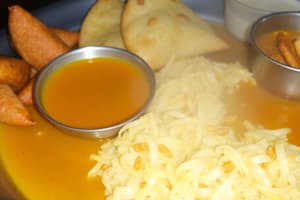Podcast
Questions and Answers
What was the ruling dynasty of Tripura in its early days?
What was the ruling dynasty of Tripura in its early days?
- The Mughal Empire
- The French Colony
- The Manikya dynasty (correct)
- The British Empire
What has been a focus of Tripura's development in recent years?
What has been a focus of Tripura's development in recent years?
- Sustainable development (correct)
- Urbanization
- Industrialization
- Population growth
What is the name of the project initiated in Agartala?
What is the name of the project initiated in Agartala?
- Agartala Green City
- Agartala Smart City (correct)
- Agartala Eco-City
- Agartala Sustainable City
What has contributed to Tripura's unique identity?
What has contributed to Tripura's unique identity?
What is Tripura trying to balance in its development?
What is Tripura trying to balance in its development?
Who was the first king of the Manikya line in Tripura's history?
Who was the first king of the Manikya line in Tripura's history?
In what year did the British East India Company annex Tripura as a princely state?
In what year did the British East India Company annex Tripura as a princely state?
What was Tripura's status in 1955?
What was Tripura's status in 1955?
What was a significant aspect of the Manikya dynasty's rule in Tripura?
What was a significant aspect of the Manikya dynasty's rule in Tripura?
When did Tripura become part of the Indian Union?
When did Tripura become part of the Indian Union?
Flashcards are hidden until you start studying
Study Notes
Tripura: A Historical Overview
Tripura is a state in northeastern India, sharing its borders with Bangladesh, Assam, and Mizoram. The state has a rich history, culture, and heritage, which is reflected in its diverse topography and population. In this article, we will explore the history of Tripura, focusing on the major events and developments that have shaped the state over time.
Early History
Tripura's history can be traced back to the 15th century when the Manikya dynasty came to power. The dynasty is named after Maharaja Manikya, who was the first king of the Manikya line. The Manikyas were known for their patronage of art and literature and played a major role in shaping the cultural landscape of Tripura.
Colonial Era
In 1862, the British East India Company annexed Tripura as a princely state, and it became part of British India. During this period, the state underwent significant changes, with the introduction of modern education, infrastructure, and governance systems. The British rule in Tripura lasted until 1947, when India gained its independence.
Post-Independence
After India's independence, Tripura became a part of the Indian Union. The state experienced rapid development in various sectors, including agriculture, industry, and infrastructure. In 1955, Tripura was made a union territory, and in 1972, it was granted statehood.
Recent Developments
In recent years, Tripura has witnessed several significant developments, including the establishment of the Tripura Institute of Technology, the expansion of the Tripura University, and the setting up of the Agartala Smart City project. The state has also been focusing on sustainable development, with initiatives aimed at promoting eco-tourism, renewable energy, and sustainable agriculture.
In conclusion, Tripura's history is a testament to its diverse cultures, traditions, and the various influences that have shaped its development over time. From its early days under the Manikya dynasty to the colonial era and post-independence period, the state has undergone significant changes that have contributed to its unique identity. Today, Tripura continues to evolve, embracing modernity while preserving its rich cultural heritage.
Studying That Suits You
Use AI to generate personalized quizzes and flashcards to suit your learning preferences.




